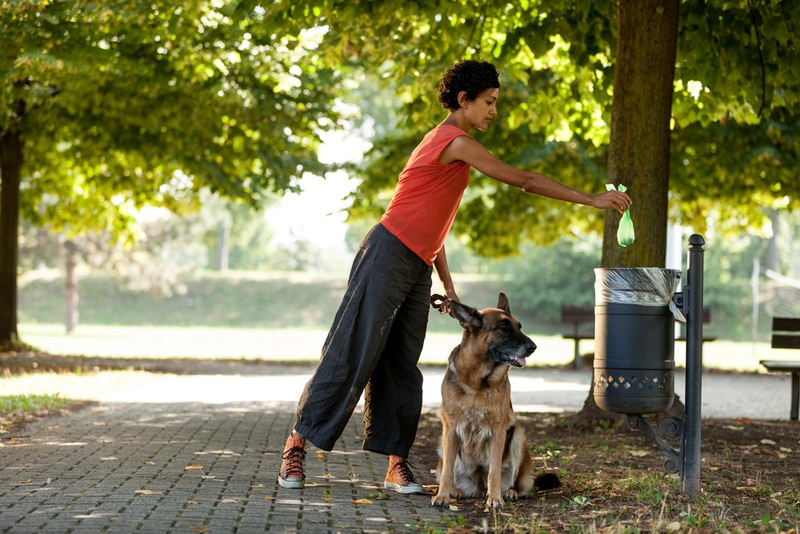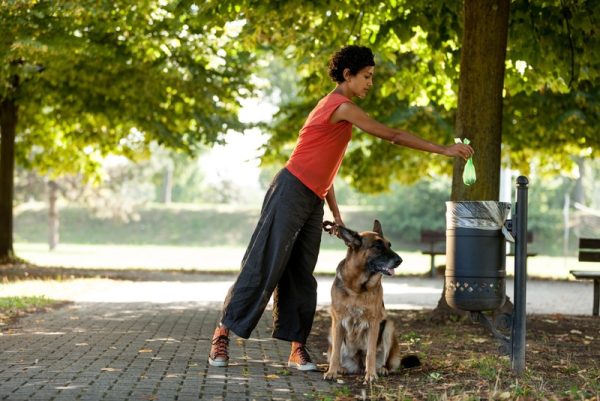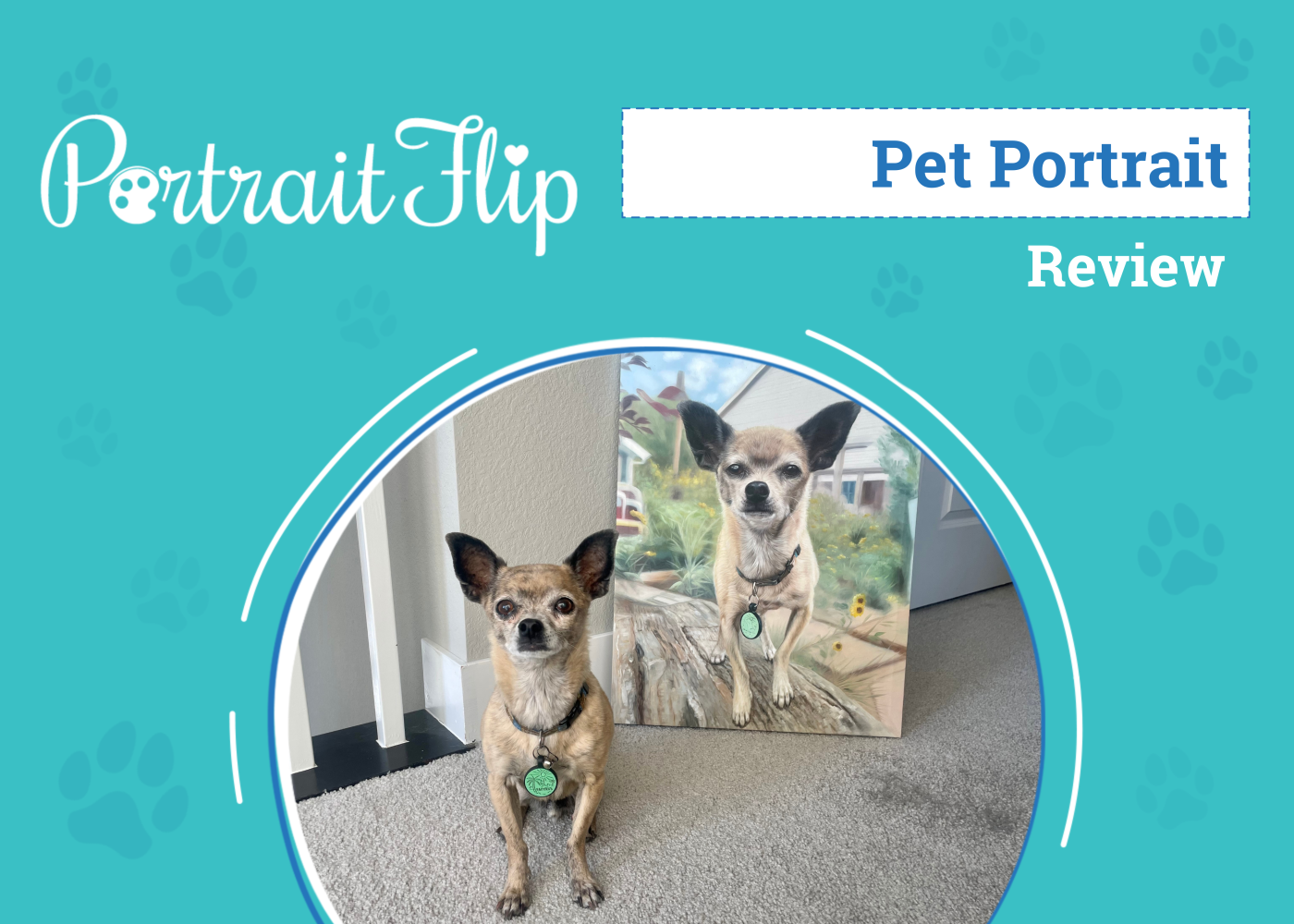So, you’ve mastered house training down—your dog hasn’t had an accident inside for months—and you think your potty-training days are over. Then, one morning, you spot poop on your concrete driveway and don’t think much of it, but you notice more and more popping up on your concrete surfaces as the days roll by—now what?
Unless you have a dog that poops on concrete you won’t quite understand the frustration it brings. Firstly, it stands out like a sore thumb. Secondly, you’re more likely to step on it because the concrete sidewalk is made for walking. And thirdly, poop on your concrete driveway is likely to get squashed as you reverse and drive your car into your driveway, leaving poop all over your wheels.
Let’s take a look at why your dog may be pooping on concrete and how to change their toilet habits.
The 8 Reasons Why Your Dog Poops on Concrete
1. Marking
It’s common for dogs to mark their territory with urine, but did you know they sometimes do it with poop too?
A dog’s poop carries their scent, and your dog may be trying to let other animals or people know that the property belongs to them. Dogs are very clever, and just as poop on concrete stands out to you, they know it’ll stand out to whoever or whatever they’re sending their territorial message. They know that poop in the grass is not only less noticeable, but it’s less potent.
Another reason your dog or another dog may be pooping on the concrete could be to communicate with each other. The scent in your dog’s poop tells other dogs that they were there. If your dog rolls in another dog’s poop, it may mean that they’re trying to override that dog’s scent.
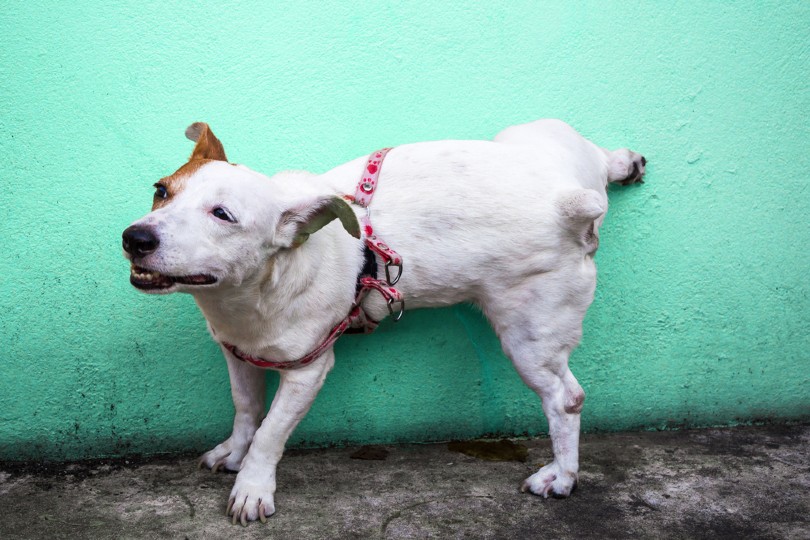
2. Age-Related Issues
If your older dog has always pooped on the grass and has recently changed their pooping business to the concrete, the problem may be age-related.
Dementia in dogs can cause them to act differently and do things that they’ve never done before. The disease affects your dog’s brain and can result in confusion and forgetting who you are, where they are, the training they’ve had, along with other memories.
Not only will your dog start pooping on areas they’ve been trained not to poop on, but they’re likely to break many other training or rules.
It’s necessary to take your dog to the vet for regular check-ups because vets will be able to pick up on signs of dementia early on and provide the resources and treatment before your dog’s health worsens.
There is no cure for dementia, but ensuring that your dog receives plenty of mental and physical exercise to keep their brain stimulated may prevent dementia.
3. Arthritis
Arthritis is a disorder that affects your dog’s joints and can cause pain, stiffness, or lameness. There is medication available for dogs with arthritis to ease the pain, but they typically still battle with getting up, walking around, and getting back down again.
If your dog has arthritis, they may have started pooping on concrete simply because it’s closer to them than the grass, the grass is down a flight of stairs that your dog battles to walk up and down, or because the concrete is flat—unlike the soft, uneven surface of grass—and causes less discomfort for them.
Other symptoms that accompany arthritis in dogs are excessive licking or chewing, fatigue, muscle atrophy, irritability, and a lack of interest in things they used to love doing.
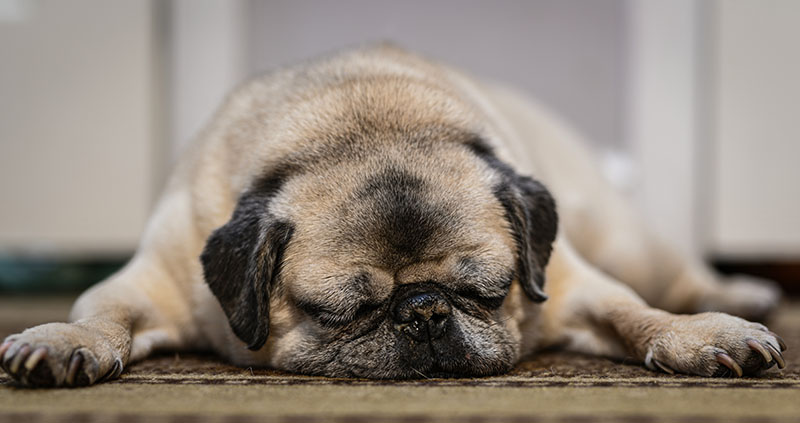
4. Frozen or Wet Grass
Have you ever chosen to rather hold your pee in until you got home than use the supermarket’s cold bathroom? Your furry companion may be doing the same thing—just in a different way.
It’s not likely that your dog is going to do something they don’t enjoy, especially without encouragement from their owners. If it’s been raining outside or the grass is covered in dew early in the morning, your dog may either hold in their poop until the circumstances are more ideal, or they’ll do it in a more comfortable area, like on your covered, dry concrete.
Dogs typically don’t like to get their paws wet or muddy and will avoid soppy, soggy grass. The same is true if it’s cold outside and the grass has become frozen. Your dog is more likely to choose the warmer, dry driveway than the cold, frozen grass to do their business on.
5. Long Grass
If you’ve been too occupied with the stresses of life to notice the length of your yard’s long grass, your dog’s new pooping spot may grab your attention.
Some dogs love doing their business in long grass so that they’re out of eye view and can have a bit of privacy. However, many dogs, especially dogs that are used to short grass, don’t appreciate the long length and would rather break their training by pooping on the concrete than having their bottoms tickled by the long grass.
Your solution to your dog pooping on the concrete could be as easy as cutting your grass.
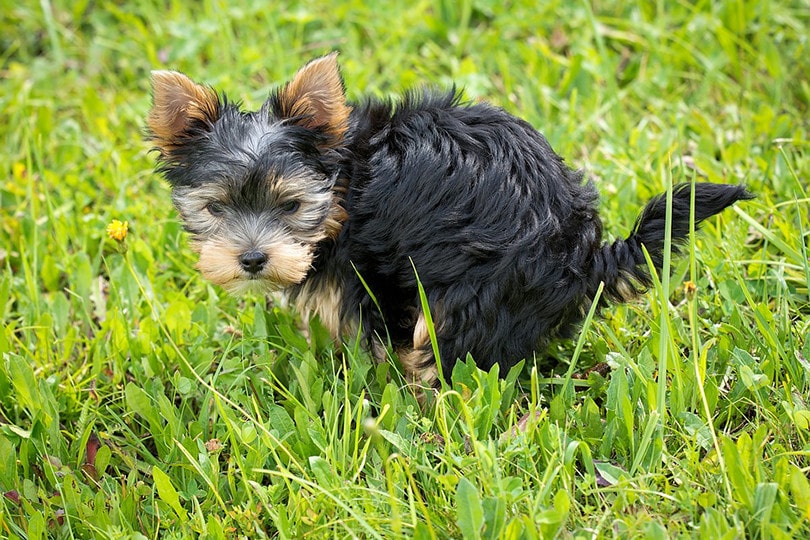
6. Habit
As much as you may enjoy rainy days, it may have an effect on your dog’s behavior. If your dog has been kept inside during a wet week or kept under the carport while still having the freedom to run around the yard if desired, their toilet training may start slipping up.
Your dog may have become so used to pooping under the carport that when the sun comes out, they carry on the same routine and avoid their previous grassy spot completely. You’ll notice that your dog is a creature of habit and thrives from routine.
Instead of reprimanding them for their new routine, rather reteach them their old one. You’ll have your furry friend using the grass again in no time!
If you haven’t cleaned up their poop in a while, they may be going back to the same area because they associate their remaining scent with toilet time and continue to use the area. It’s important to remove the smell from your concrete completely.
7. A Bad Experience
The grass is a place filled with bugs and creatures, with some that bite or sting. If your dog has been trained to poop on the grass and has suddenly stopped, it may be because they had a bad experience, such as a nasty case of diarrhea, or they were bitten or stung by an insect while pooping on the grass.
The bad experience may have turned your pup off the grass and onto the “safer” concrete.
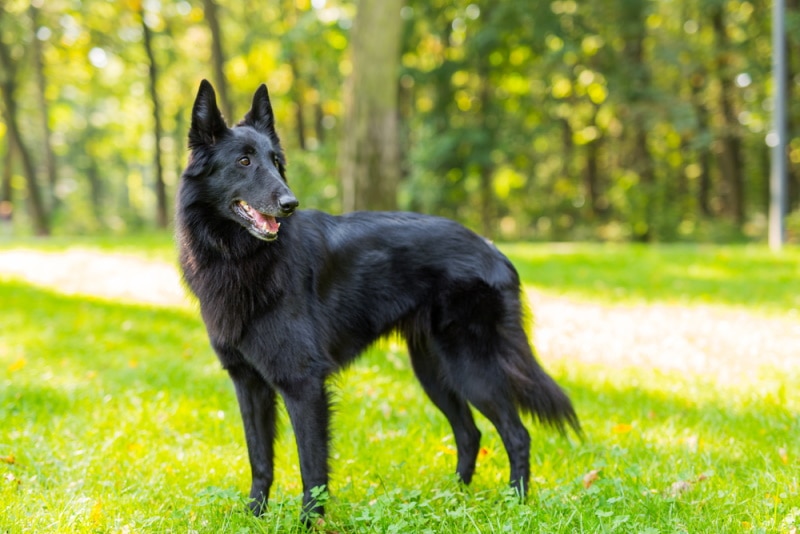
8. Your Dog is Young or Newly Adopted
A puppy will pee and poop wherever they feel fit, so you’ll need to train them to poop outside and where to do it.
A newly adopted dog may poop on concrete because that’s what they’ve been brought up to do. Unfortunately, many dogs that come from puppy mills often have never had the luxury of sniffing the grass, rolling on it, or doing their business on it. They’re often brought up in limited areas that only consist of concrete and have therefore only ever been known to poop and urinate on the concrete.
Once you’ve adopted a new dog and brought them to your grassy home, they may poop on whatever concrete they find, large or small, because that’s all they’ve ever known to do. You can change this behavior by potty training them and giving them a lot of love and patience while doing so.

How To Change Your Dog’s Pooping Spot
If you’re eager to train your puppy or dog to poop on the grass or want to fix their new bad pooping habit back to their good old one, there are several ways to do it.
Use Pee Pads
To start the training process, you could use pee pads. Puppies and dogs tend to use pee pads because of the way they smell. You can put one down on the concrete area your dog has been pooping on, and when they use it, praise them and give them treats.
Once your dog solely poops on the pads, move them to the grass. You can put some grass clippings on the pee pads until your dog is familiar with the smell and then remove the pads altogether. When your dog poops on the grass where the pads used to be, praise them and let them know they’re doing the right thing.
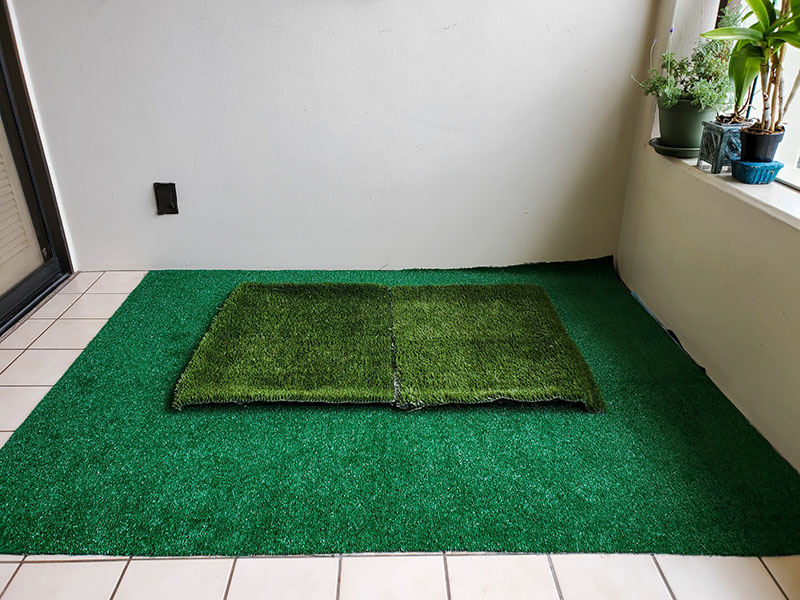
Go Out with Your Dog
Once you’ve fed your dog and given it a bit of time, take your dog outside to relieve themselves. You can let your dog out to sniff around and continuously call them to the grassy area until they poop, or you can keep your dog on a leash and resist their tugs to run over to the concrete area. Eventually, your dog will poop on the grass. Make sure to praise them and give them treats when they do.
If your dog doesn’t poop when you’ve taken them outside, take them back inside and repeat the process after a bit of time or when your dog starts to become restless. Continue this process until your dog starts to poop on the grass without your intervention or influence.
Place Their Poop on The Grass
Another tip you could try is taking some of their poop and placing it in the yard where you’d like them to poop. As we mentioned previously, dogs pick up their scent in their poop and are more likely to poop where that smell is because it makes them feel as though the area is safe enough to do their business in.
With saying that, make sure to thoroughly clean the concrete where your dog has previously pooped so that they don’t go back to their scent there. You can use natural, pet-friendly cleaners or vinegar to remove any poop smell from your concrete.
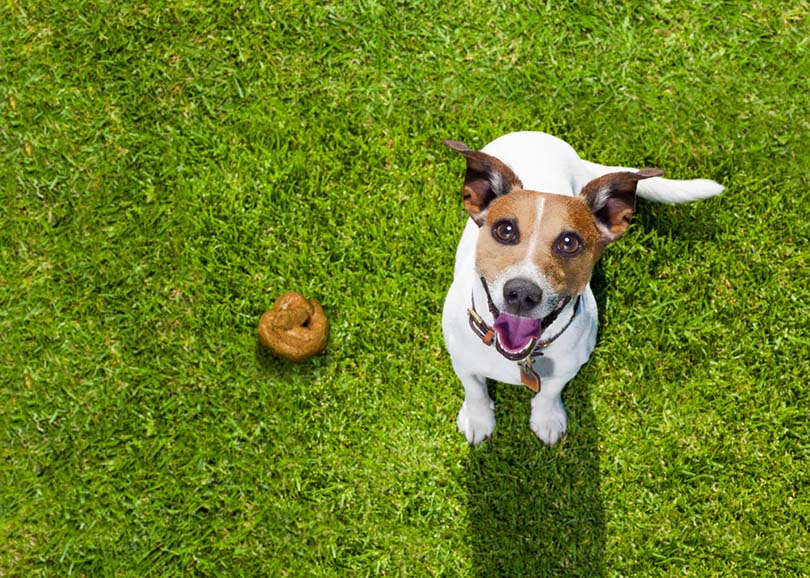
Final Thoughts
Your dog may be pooping on the concrete for several reasons, such as marking, a lack of training, habit, preference, or health-related problems. If your dog’s behavior has changed, with other symptoms accompanying the new habit, take your dog to the vet as it could be something serious that needs treatment.
You can train your dog to poop on the grass by starting with pee pads, supervising them, praising them, and giving them treats to reward their good behavior. Some dogs will be easier to train than others. Stay consistent and give them a lot of patience and love.
Related reads:
- Why Do Dogs Roll In Poop? 4 Reasons and How to Stop It
- How to Get a Dog to Poop in the Snow: 7 Expert Tips
Featured Image Credit: Francesco83, Shutterstock

